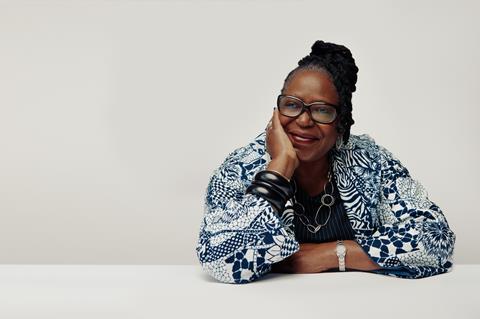The recipient of this year’s Bafta award for outstanding contribution to British cinema talks to Screen about the June Givanni PanAfrican Cinema Archive and why the films of this movement are still regarded as “other”

Despite an impactful four-decade career as a programmer, curator, writer and archiver, June Givanni can not quite believe she will be accepting the Bafta award for outstanding contribution to British cinema this Sunday (February 18). “It’s very hard to put it all into context and I keep asking myself, ‘do I deserve it?’,” she admits. “I know many other people who’ve also done great work and who I think would deserve such an honour.”
This humility and generosity of praise is a common theme in Screen International’s conversation with the Bafta honouree. When discussing her career – most notably, the June Givanni PanAfrican Cinema Archive (JGPACA), which contains over 10,000 artefacts relating to pan-African and Black British cinema – Givanni is keen to namecheck as many colleagues, filmmakers and supporters as possible.
The first of which, former Greater London Council’s head of race equality Parminder Vir, led the Third Eye Film Festival where Givanni started her career in 1983 as a co-ordinator of the festival’s Third World Cinema strand. Then there is film scholar Jim Pines who brought Givanni into the fold at the BFI where she set up the African Caribbean Film Unit. Here, she also flags Gaylene Gould with whom she founded the Black Film Bulletin in 1993.
Her biggest achievement - the JCPACA - is something Givanni had never intended to do at all. The archive began as the programmer’s personal collection from her time at various festivals around the world including Toronto International Film Festival’s Planet Africa and India’s Kerala International Film Festival.
“I was collecting a lot of material, it was like my currency,” Givanni explains of the tapes, posters, photographs and various other items she accrued across the globe. “It was material that I could share between the different territories that were part of building this idea of what Pan African cinema is, and could be, and should be.”
The collection only became an archive “when [the material] got too big for my son’s bedroom” jokes Givanni and moved to a community centre in Brixton and Stockwell. “I thought ‘there is so much to be done, so much to say about this and where it relates to the rest of the world’, I thought I need to do something with this collection,” Givanni explains.
Set up with co-directors Imruh Bakari and Emma Sandon, the volunteer-led archive began to take on a life of its own with open days, courses and exhibitions, accumulating in what is now one of the largest independent archives in the UK. To this day, Givanni says it runs as “a living archive that I still programme and curate for and that others contribute to or are inspired by in the course of their work”.
Finding spaces
Despite the changes in industry and attitudes Givanni has witnessed (and influenced) during her extensive career, she has concerns that pan-African cinema is still perceived as “other”. “The biggest challenge is trying to find spaces where you can continue to demonstrate the potential of pan-African cinema,” Givanni explains. “If you are so ignorant of other cultures, of other civilizations, and what they contribute to the world, you miss out.
“The fact that we are involved in activity and culture that requires a lot of requires a lot of knowledge and skill, things that people don’t automatically expect us to be able to contribute to, that struggle continues.”
For now, Givanni hopes receiving this award – previous recipients of which include Mike Leigh, Andy Serkis and Number 9 producers Stephen Woolley and Elizabeth Karlsen – will go some way to shining a light on pan-African and Black British cinema, as well as the archive itself which she hopes to expand further.
As for the biggest reward of her career has been so far, it is no surprise that Givanni once again takes this opportunity to sing the praises of those around her as well as filmmakers like Horace Ové, Raoul Peck and Euzhan Palcy.
“The fact that those people value what I do and what the archive does. These are rewards,” Givanni says. “Our great team of staff - young people with inspiration, with skills with ideas, and who are part of what we’re doing. These are the greatest rewards of all.”















![[L-R]: Amanda Villavieja, Laia Casanovas, Yasmina Praderas](https://d1nslcd7m2225b.cloudfront.net/Pictures/274x183/6/4/1/1471641_pxl_20251224_103354743_618426_crop.jpg)








![[L-R]: Amanda Villavieja, Laia Casanovas, Yasmina Praderas](https://d1nslcd7m2225b.cloudfront.net/Pictures/100x67/6/4/1/1471641_pxl_20251224_103354743_618426_crop.jpg)
No comments yet